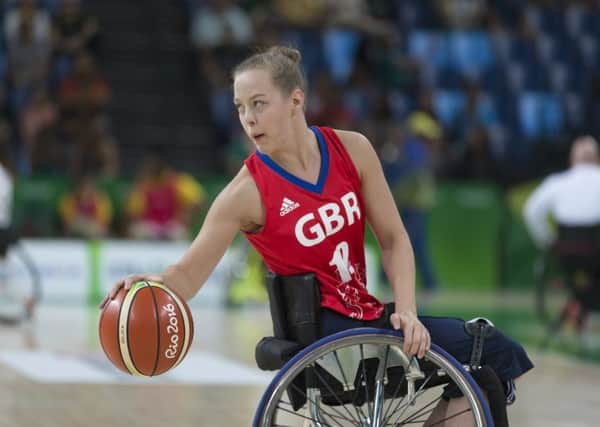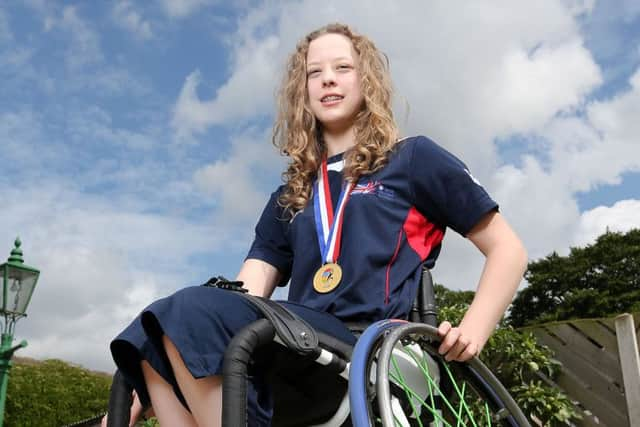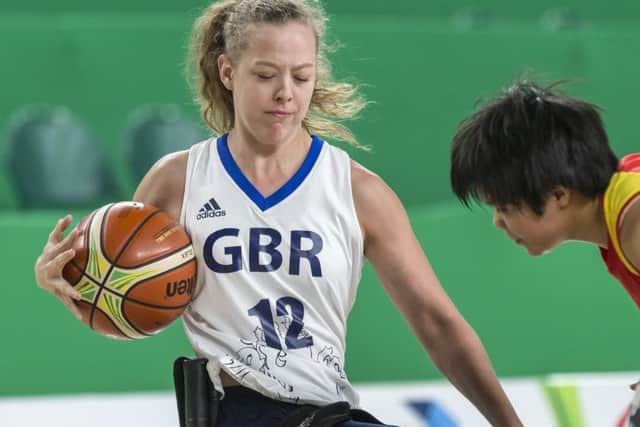Weekend Interview - Leah Evans ready to inspire the next generation


She was 15 at the time and her youth had been spent hampered by disability.
Evans was born with bilateral hip dysplasia, which meant her bones did not form properly in her legs and hips.


Advertisement
Hide AdAdvertisement
Hide AdAs the years went by her disability progressed to scoliosis (sideways curvature of the spine).
Because of this, the young girl who grew up in a rugby league-mad family in Castleford did not play sport, either through her inability to do so, or the lack of confidence that brought.
So as she lay there on the hospital ward, contemplating spending the rest of her life in a wheelchair, a career as a fully-funded professional sportswoman was the furthest thing from her mind.
And yet...


“I was laid on my hospital bed watching the wheelchair basketball at the London Paraylmpics,” begins Evans, 22.
Advertisement
Hide AdAdvertisement
Hide Ad“My mum and I were watching it and I was saying ‘I want to give it a go’, not thinking my mum would actually do anything about it.
“Then when I got out of hospital she took me to a local club in Featherstone.
“So I tried wheelchair basketball and I’ve not looked back.”
That is an understatement.
For within four years of watching Great Britain’s wheelchair basketballers at their home Paralympics, Evans was a Paralympian herself in Rio, but even then, only after a doctor told her that the surgery required on a recently-developed brain injury could wait until after the Games.
Advertisement
Hide AdAdvertisement
Hide AdThis weekend, Evans embarks on her third successive European Championships campaign and next summer, if all goes to plan, her second Paralympics in Tokyo.
If the motto of the London 2012 Olympic and Paralympic Games was to ‘inspire a generation’, then in Leah Evans they can celebrate a job well done.
“Until starting wheelchair basketball I had never done any sport – and that was age 15,” says Evans, herself amazed at how quickly her life was transformed.
“I used to dance a little bit when I was kid, but that was part of my physio, a way of getting me moving.
Advertisement
Hide AdAdvertisement
Hide Ad“I could never do it as part of a group. I could walk a little bit as a kid. I thought I was great at walking but it turns out I wasn’t.
“I’ve since been told my mum used to pay my brother pocket money to let me win at things.
“I’ve been permanently in a wheelchair since I was 15.”
But as so many before her have learned, a wheelchair does not have to signal the end of life and of freedom, it can open different doors and opportunities.
“I wish I knew how I took to wheelchair basketball so quickly,” she says.
Advertisement
Hide AdAdvertisement
Hide Ad“It has taken some work – obviously after not doing sport before I came into basketball blind. Wheelchair rugby was never an option because it’s more of a contact sport.
“From my very first session of basketball, I was made to feel like I didn’t have a disability. And I loved that about it.
“Everybody was so welcoming. Then I started going to more training sessions, I was wanting to play in all the leagues I could play in. I just couldn’t get enough of it. It’s amazing how much of a family it becomes.”
She played at her local club in Featherstone first but quickly progressed to Sheffield Steelers, whose senior team plays in the top league in the country.
Advertisement
Hide AdAdvertisement
Hide Ad“I remember my first club session at Sheffield and my friend Maddie (Thompson), who I’m best friends with now, was on all the posters.
“It was quite surreal. You don’t think it could happen to you.
“Same with the GB squad. When I first started going to national training, it was quite daunting for me because I had watched these guys on telly only a few years earlier.”
Helping her on her journey were her loving and supportive parents, and her mum whose intervention in 2012 set the wheels in motion.
Advertisement
Hide AdAdvertisement
Hide Ad“We lived in Castleford and the GB programme at that time was in Worcester, so for us that’s at least a three-and-a-half-hour drive, doing the drive in the morning, training and then going back home,” reflects Evans.
“I was in college at the time, my mum had to go to work; it was mental the commitment we were putting into it. When I think about it now, I don’t know how we did it.
“I owe a massive amount to my family.”
It is difficult to imagine who would have been happier in 2017 when the GB wheelchair basketball programme relocated from Worcester to a purpose-built state-of-the-art facility at the English Institute of Sport in Sheffield.
It is there that we meet, two weeks out from the European Championships which begin across the North Sea in Rotterdam tomorrow.
Advertisement
Hide AdAdvertisement
Hide AdSheffield is home to a number of Olympic governing bodies – boxing, table tennis included – and each has the best facilities Lottery money can fund.
The court that houses the British wheelchair basketball programme is among that number, and is better funded than their able-bodied basketball counterparts.
Why? Because the wheelchair basketball squads are genuine medal contenders at every tournament they go to.
At the Rio Paralympics, they were fourth, third at the European Championships in Tenerife the following year and runners-up to Holland at the world championships in Hamburg 12 months ago.
“We’re on an upward trajectory,” says Evans.
Advertisement
Hide AdAdvertisement
Hide AdIf first is to be the natural conclusion to that trajectory, they have their work cut out in Rotterdam. The European Championships are contested by six teams in a league format with each nation playing every day.
Great Britain begin against France tomorrow, then play Spain, hosts Holland and Turkey before finishing their campaign against Germany, the Paralympic silver medallists.
“We’ve been knocking on the door but not got over the line,” says Evans, whose inclusion in the squad is the only change from the team that won a silver at last year’s worlds. “As a group, our average age is 24 and we’ve been the same group for a good three years now. Collectively, we know each other really well, we have that on other teams, they are all starting again with new people.
“We’re going there to win it, but it will be tough, the European nations are the best in the world.”
Advertisement
Hide AdAdvertisement
Hide AdGreat Britain’s status as the best-funded of all the competing countries merely adds to the pressure to get results and continue that upward trajectory.
More medals means more money coming into the programme, more time for Evans and her team-mates to dedicate themselves full-time to the sport.
And more chance that either this week in Rotterdam, or next year in Tokyo, there might be a young girl in a hospital bed frightened about what the future might hold, who might look up to the television and see Leah Evans competing at the Paralympics and be inspired.
